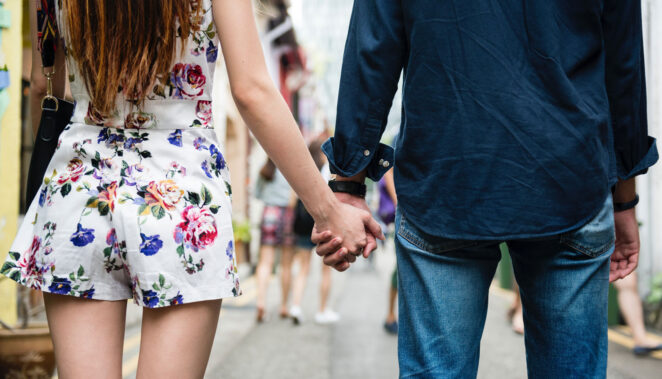The highs and lows of sex, dating, and romance can seem a bit like a roller coaster. For people in early recovery from drug or alcohol addiction, the fast turns, sudden dips, and hair-razing loops of a new relationship can destabilize sobriety and trigger a relapse. Even if you’re strapped in and following the safety protocol, enough big bumps in the ride can turn even the strongest commitment to recovery on its head.
This reality begs a common question: Is it ever okay to date in early recovery, and if so, how do you know if you are ready? And are there questions to consider or guidelines to bear in mind that can help gauge readiness to date? The answer is “yes.” What follow are some tips, insights and considerations that may help in that discernment process.
How Dating Can Trigger Relapse – Especially in the First Year

In my own work with discharged patients who are new to sobriety, I’ve seen firsthand how dating in this earliest phase can be detrimental to recovery. In the worst-case scenarios, it has led to overdose and relapse. These dangers are why most treatment centers encourage people not to date during the first year of sobriety. (Learn about the treatments and aftercare supports at FHE Health that are helping people stay sober in their first year and beyond.)
That said, while the “no-dating-in-the-first-year rule” is a general guideline—and a good one to follow whenever possible—it is not universal. There may be a small minority of people who can and do safely date during their first year of recovery, because every individual is different.
There are also many people who may reach the first-year mark in recovery and feel like they still need more time to grow before dating. (More about that in a bit.)
Gauging Readiness to Date – Good Questions to Ask Oneself

Since each situation is unique, it may be helpful to ask oneself several key questions when gauging dating readiness.
At the top of the list? Emotional readiness. Relationships can come with a whirlwind of feelings, some positive and some negative. An important consideration before hopping into dating is to think about how you’ve been handling your emotions since getting into recovery:
- Are you practicing emotional self-awareness and appropriate self-care daily?
- Have you internalized the acronym “HALT” (for “Hungry, Angry, Lonely, and Tired”) and know how to deal with these potential triggers in healthy ways?
- Do you have an effective plan in place for managing cravings driven by emotions?
Another question to ask: How well are you balancing your responsibilities like work, school, family, and friends, in addition to your recovery? Are you certain you can keep your recovery in the forefront while trying to build a relationship with someone new?
Also, what are your motives for dating? It’s important to talk to your support system about this question. Your support system consists of the people who really know you and care for you. For instance, if both your therapist and your sponsor suggest you not get into a relationship, it’s best to follow this advice. (And who knows, it could be the opposite—they may encourage you to take that step!)
If the motive is to be in a happy, healthy, stable relationship, what I can say from working with people in early recovery is that most who don’t rush it are grateful for the time they spent focusing on themselves first. In contrast, those who hurry into a relationship often say later that they knew it was not a great idea but did it anyway, and it didn’t work out all that well.
There have also been the times when I have seen the chronic relapser or chronic dater
take the time and space to work on themselves and make a truly beautiful transformation.
What to Watch for if You Try Dating in Early Recovery

If you decide to try dating in early recovery, one approach might be to think of it as an experiment that you can always back out of if it’s not serving your recovery. It may be an opportunity to test whether you can really date and continue to keep recovery your number-one priority. In other words, when dating never put recovery on the back burner.
There is a common expression used in many 12-step fellowships, which is that everything you put in front of your recovery, you will lose. Continue with everything you have instilled in your process of staying sober: going to meetings, working with a therapist, continuing with your spiritual practices, spending time with your support system, etc.
Additionally, if you chose to date someone who is also in recovery, remember that your program of recovery is yours, and theirs is theirs. You are your own individual, and no one can do your work for you.
The Benefits of Taking Time for Recovery Before Dating – A Personal Anecdote

In my case, I obeyed the no-dating rule that my sponsor recommended in my first year of recovery, and on day 366 of recovery, I was certain that I was ready to take on the dating world.
I quickly realized that I hadn’t done quite enough work yet and wasn’t ready to have someone in my life in that capacity.
The next few years I devoted to working entirely on me. I continued my 12-step work, sponsored other women, built up a fantastic support network, kept up with my therapy, got a fantastic job, started back at school, bought my own home, and traveled as much as possible.
I met my husband when I had been sober for four-and-a-half years. I entered the dating game with the mindset that I wasn’t looking for anyone to fix me or make me feel better. I was looking for someone to share the great life that I had made for myself.
I’m not saying that because I waited longer to date everything has been sunshine and rainbows—it hasn’t. But, because of the strong foundation I built in that time working on myself, I have been able to work through the bumps in the road, build a beautiful marriage and am incredibly grateful to say I will be celebrating 10 years sober in November.
“Good things come to those who wait,” as the saying goes. The same might be said of taking time to master recovery before leaping back into the dating world.
This article was provided by Molly Mammen who is Director of Alumni Services & Resources at the national behavioral health provider FHE Health.
 Vermont Republic Second Vermont Republic
Vermont Republic Second Vermont Republic



